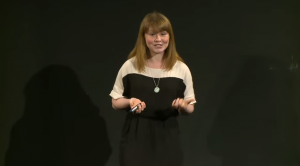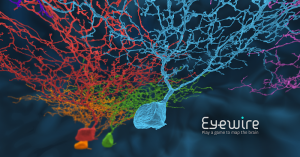It was August at this point, the summer was winding down and I was on my way to my hometown in Massachusetts. I hadn’t been home in a while and I asked my mother if she knew of anyone who might know of a place I could work- she had recently begun a job in management of online courseware at MIT. She must have met a few important STEM-ers along the way. She knew a recent grad named Claire who was working on an online neuroscience course. I googled her, and found a her speaking at TEDx.
Claire O’Connell at TEDxAtlanta
 Woah! She’s about my age and she’s spoken at TEDx? How cool. As I watched the video I became more and more impressed with her accomplishments and stage presence. At the center of the video I became excited- she began talking about a project that had turned neuroscience lab work into an interactive computer game. This is what I’m interested in. In all honesty, the prospect of working in a science lab scared me- doing tedious, slow work and never being sure whether you’ll end up with a product. In making this computer game, they’re taking research beyond the lab. Regardless of whether they find significant results in each individual project, they had a successful way to get to the results. This is cool. This is innovation. I wanted to be a part of this. If you didn’t have time to watch the video, EyeWire is a “Game to Map the Brain” where anyone, anywhere can create an account and trace their way through a branch of a neuron(brain cell) as it weaves and wanders throughout the retina- the part of the eye that translates light into electrical signals, which is the language of the brain. It’s kind of like a virtual, 3D, paint-by-numbers where a player receives points and powers by painting. If you are interested in playing, it requires no scientific background:
Woah! She’s about my age and she’s spoken at TEDx? How cool. As I watched the video I became more and more impressed with her accomplishments and stage presence. At the center of the video I became excited- she began talking about a project that had turned neuroscience lab work into an interactive computer game. This is what I’m interested in. In all honesty, the prospect of working in a science lab scared me- doing tedious, slow work and never being sure whether you’ll end up with a product. In making this computer game, they’re taking research beyond the lab. Regardless of whether they find significant results in each individual project, they had a successful way to get to the results. This is cool. This is innovation. I wanted to be a part of this. If you didn’t have time to watch the video, EyeWire is a “Game to Map the Brain” where anyone, anywhere can create an account and trace their way through a branch of a neuron(brain cell) as it weaves and wanders throughout the retina- the part of the eye that translates light into electrical signals, which is the language of the brain. It’s kind of like a virtual, 3D, paint-by-numbers where a player receives points and powers by painting. If you are interested in playing, it requires no scientific background:
I emailed Claire about having brunch and discussing opportunities for me in the neuroscience field. It seemed weird to me, to email someone I’d never met and ask for a favor or connection. She would not know my credentials, my history, anything. I had done nothing for her. But I guess that’s how all of this works- you ask anyone you can. And you expect nothing, you just hope. She sent me a message riddled with excitement and smiley faces. We met for brunch and she spoke about labs at MIT, I explained my interest in doing work outside conventional lab settings. I didn’t mention EyeWire, because it felt uncomfortable to admit that I’d listened to her speak for twenty minutes before meeting her. In hindsight that was silly. I should have brought it up, but luckily, she did. I told her I was interested in interning with the team.
Claire arranged a second brunch where I would meet two of the most important people at EyeWire, after which I would get to peek at their lab. I found a fantastic parking spot right outside of the café where we would be meeting, so moral was high. My car looked beat up and dusty after its recent cross country drive and encounter with a metal pole. But I thought I looked put together. Brunch went well- I tried my best not to be shy.
On the way from brunch to the lab we passed my car and I suppressed my urge to break the current silence with the useless filler sentence “That’s my car”. I needed to removed association from my block-break road-trip lifestyle, for I was playing the role of Future Science Office Woman today. The “lab” was an office with lots of posters and a colorful couch and decorations. Everyone was under 30 years old. This was the hippest science lab ever. I received a brief tour and then everyone had to get back to work.
I returned home with excitement and confusion. This was the closest thing I would have to an interview with EyeWire and it was so unofficial. They said they were interested in having me intern, but on what principles? All I had shown them were my abilities to eat a sandwich and show some enthusiasm. I spent the next few months sending emails, and follow-up “did you receive my last email?” emails. I sent them my resumé and a writing sample but I think the realest thing I showed them was that my interest was big enough that I would not take silence as a “no”. Mere persistence doesn’t seem like a credential but I guess when it really comes working in the real world, skills can only get you so far while passion allows you to learn on the job, work diligently and put in an extra effort. That’s how I’m going to justify it all, but in a sense I fell into my internship. I showed up and it just happened. From this experience I hope to be able to keep my moral up when I apply to jobs in the future, because sometimes not getting a job will be random, just as receiving a position at EyeWire has been a bit random. In the future I might not know the right person or due to luck, the person I interview with will have already fallen in love with another applicant. And maybe another time, due to chance, I’ll just fall into a position.
Last week I began my internship with EyeWire, and my next post will be what I have done, seen, and thought so far.
